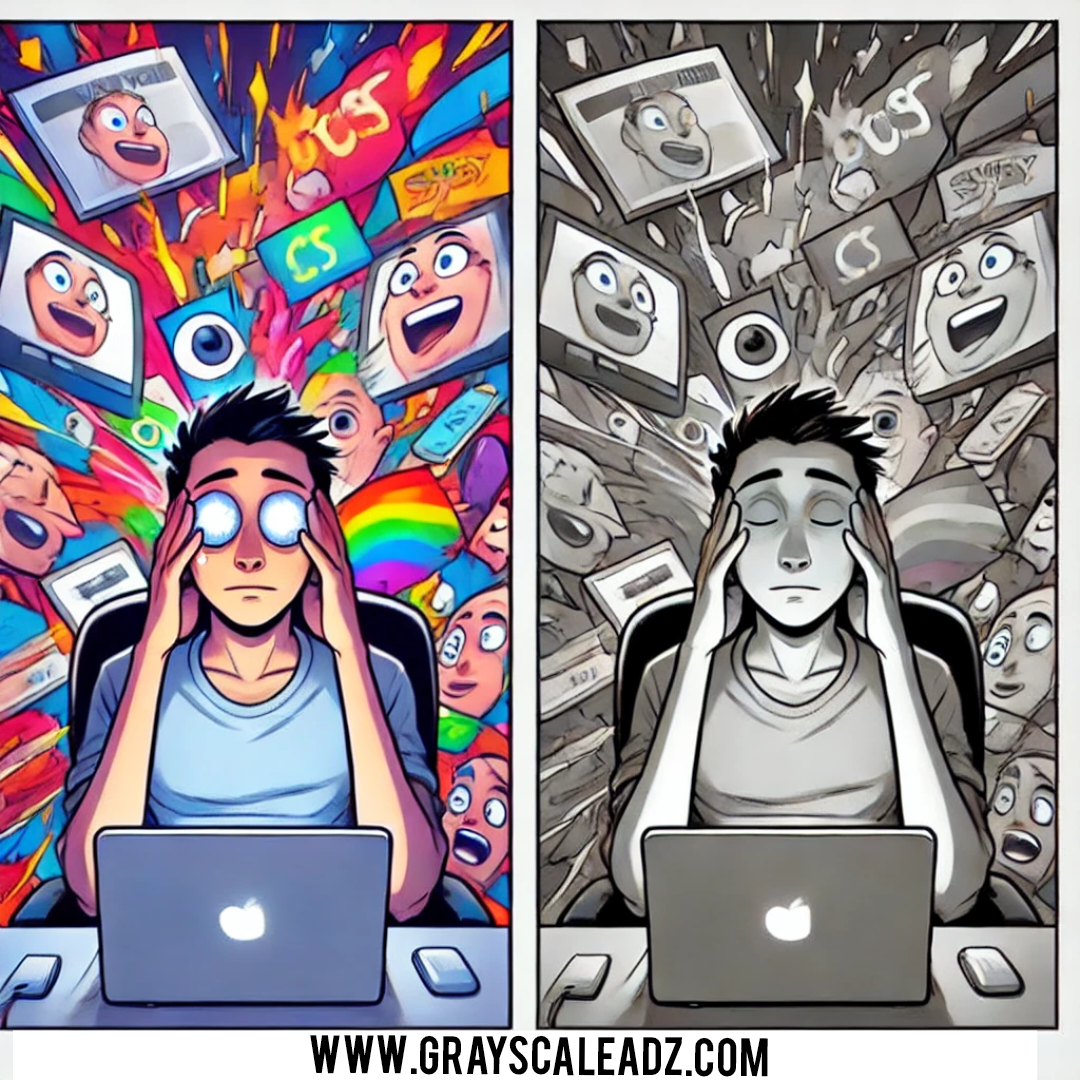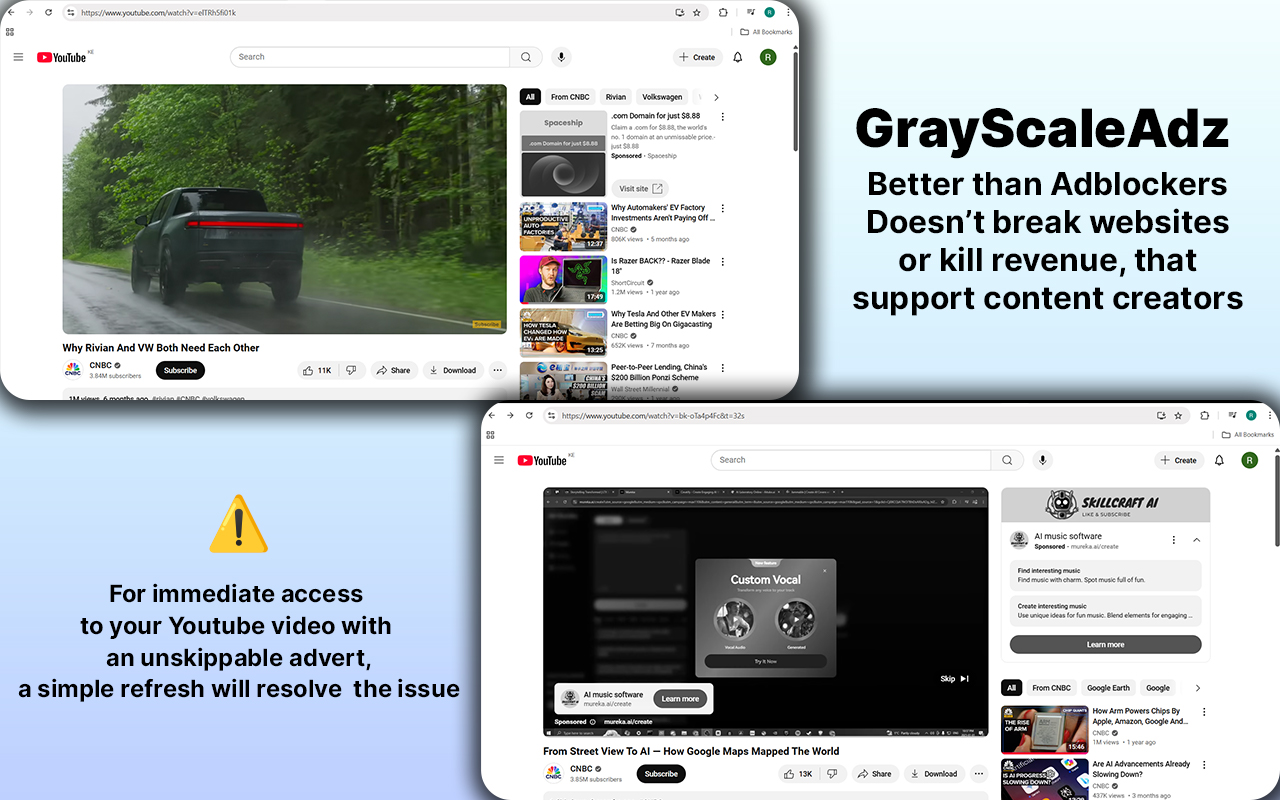.jpeg)
The idea for GrayscaleAdz came to me in a simple but frustrating moment. I was reading an article I really cared about, but I couldn’t stay focused. My eyes kept jumping to the flashing, colorful ads crowding the page. No matter how valuable the content was, my concentration was under attack.
I’d tried traditional ad blockers before, but they never felt like the right solution. Blocking ads completely often broke websites, messed with layouts, or deprived creators of the revenue they needed to keep producing content. I didn’t want to punish the very people who were building the internet I enjoyed.
That’s when it clicked for me: maybe the problem wasn’t ads themselves, but the way they were designed to hijack attention. What if instead of erasing them, we softened them? What if we stripped away the aggressive design and left something that supported publishers without overwhelming users?
The solution turned out to be simple—remove the color. By turning ads grayscale, they lose their psychological pull but still exist, supporting creators and keeping the internet free. That was the moment GrayscaleAdz was born.

Yes, we take a fundamentally different approach from standard ad blockers. The industry has always operated on extremes: either you allow ads in full force or you block them completely. Both come with serious downsides. Blockers break websites and strip away publisher revenue, while leaving ads untouched floods users with distraction.
GrayscaleAdz is the middle path. Instead of erasing ads, we neutralize them. By removing the colors and tricks designed to grab your attention, we create ads that fade into the background while still supporting creators. It’s humane, balanced, and respectful of both sides.
Surprisingly well! At first, advertisers are skeptical—color is such a core tactic in traditional advertising. But when they realize their ads are still visible, just less aggressive, their perspective shifts.
GrayscaleAdz offers a compromise: visibility without hostility. And early feedback suggests that advertisers appreciate not being entirely blocked.

Right now, the big challenge is moving GrayscaleAdz beyond being just a browser extension for individuals. The real opportunity is in working directly with publishers and content creators.
Most publishers today treat ad blockers as enemies—they either block users who use them or guilt-trip them into whitelisting. But that creates conflict, not solutions. I want to build partnerships where publishers see GrayscaleAdz as a fair alternative. Imagine visiting a site with an ad blocker and instead of being locked out, you’re shown a gentle prompt: “There’s a better way. Support this site with grayscale ads instead.”
That’s the bridge we’re trying to build. It’s not just a technical shift but a cultural one—showing publishers that they don’t have to fight their audiences, and showing users that supporting content doesn’t have to cost their focus or peace of mind.
AI opens exciting possibilities. Imagine dynamic grayscale intensity based on user behavior or ad types. We could even offer performance analytics to advertisers comparing grayscale vs. full-color campaigns.
AI could also help detect overly intrusive designs and apply different levels of neutralization. It’s not just about softening ads—it’s about using smart tools to create a fairer digital environment.
Absolutely. The same philosophy can apply to notifications, social feeds, e-learning—any digital interface that bombards users with stimuli.
We see GrayscaleAdz as part of a broader movement toward calmer digital design. Think of us as one piece of a bigger puzzle that reimagines the internet as a humane space, not an attention warzone.
The vision for GrayscaleAdz is to restore balance to the internet. I like to compare it to what happened in Yellowstone when wolves were reintroduced. They didn’t just control the elk—they changed rivers, revived forests, and restored harmony to the ecosystem.
Right now, the digital ecosystem is out of balance. Users are overwhelmed by noisy, aggressive ads, while publishers are starved when those ads are blocked. It’s a cycle of conflict where no one truly wins.
Our mission is to break that cycle. By softening ads instead of erasing them, we create space where both sides can thrive. Users reclaim their attention, publishers keep earning, and the internet becomes calmer, fairer, and more humane. That’s the transformation we’re working toward.
So far, we’ve been bootstrapped, building lean and proving the concept. Now, we’re exploring strategic partnerships with forward-thinking publishers and ad-tech investors.
We’re also looking at grants in the attention management and digital well-being space. For us, it’s not just about capital—it’s about finding partners who share our mission.
If I could do it again, I’d focus directly on publishers from the start instead of going only to individual users. I’d build a system where publishers could integrate GrayscaleAdz into their sites, so when visitors arrived with traditional ad blockers, they’d be offered a softer alternative instead of being blocked or guilted.
Looking back, that could have built a stronger bridge between creators and audiences right away. GrayscaleAdz wouldn’t just be a tool you download—it would be a standard, woven into the internet itself. That’s the path I’d take if I were starting fresh.
Check out the profile to see their latest milestones and subscribe to stay in the loop with all their updates!
Inspiring founder stories you can’t miss!